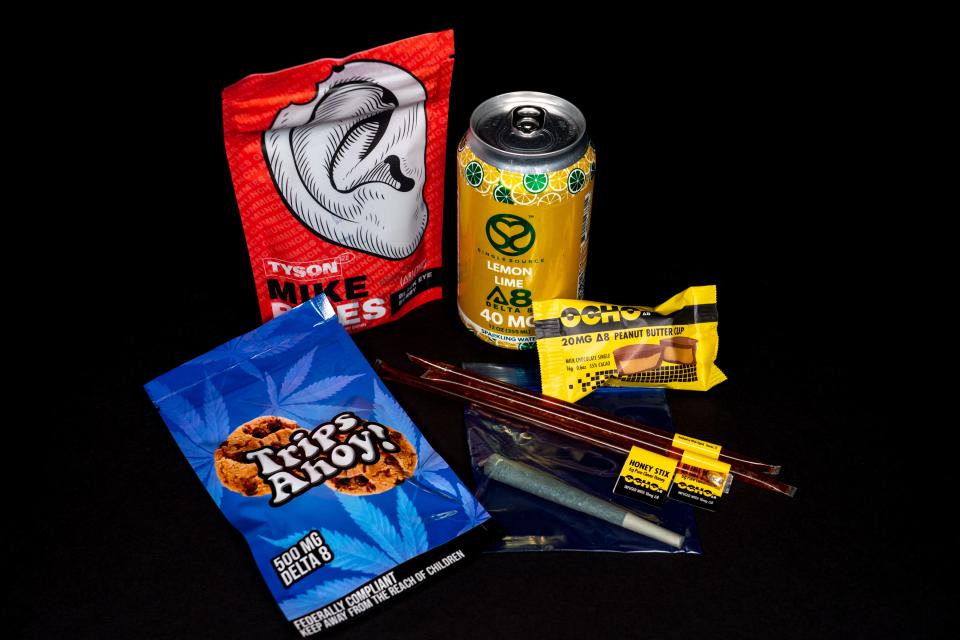'Intoxicating' hemp products like delta-8 are illegal under Arizona law, AG Kris Mayes says
"Intoxicating" compounds made from hemp are illegal in Arizona and any stores selling them should stop immediately, according to state Attorney General Kris Mayes.
The formal opinion she issued March 11 came as policy over hemp-derived products could still be considered this year in the state Legislature. Some Republicans are pushing to make the products legal and regulated, while others wanted laws to allow only licensed marijuana dispensaries to sell them.
The affected hemp products "cannot be legally sold outside of a licensed dispensary. And we expect people to comply with the law," said Richie Taylor, Mayes' spokesperson.
Mayes will work with a fellow Democrat, Gov. Katie Hobbs, and "relevant state agencies on how the opinion might be enforced," Taylor said. He added: "We'll be working with state partners to get the word out."
Hemp is a type of cannabis plant containing less than 0.3% tetrahydrocannabinol, also known as THC. The main intoxicating compound in marijuana is delta-9 THC, which can be found in much larger percentages in marijuana plants than in hemp.
But compounds can be extracted from hemp and concentrated in quantities large enough to be used in vape pens and infused into food like gummies. The products made from hemp include compounds like delta-8 and delta-10 THC that reportedly produce mild intoxication.

Sellers, manufacturers may face severe penalties
Sales of consumable hemp products took off in 2018 through what some call a loophole in that year's federal Farm Bill. An Arizona law signed by former Republican Gov. Doug Ducey that year created a legal hemp industry in Arizona.
But Jon Udell, political director for pro-marijuana group Arizona NORML, said that smoke shops and other retail outlets that sell hemp products that may produce intoxication could be "potentially in serious legal jeopardy" if police and prosecutors enforce Mayes' opinion.
The opinion classifies intoxicating products made from hemp as narcotic cannabis in Arizona law, legal to be sold only by licensed marijuana dispensaries to adults 21 and older. A single sale of illegal narcotics without such a license is a Class 2 felony that could put violators in prison for up to 13 years. The punishment would be similar for people who manufacture or transport the products.
Although the opinion refers only to intoxicating hemp-derived products, Udell worries it may also criminalize sales of products with cannabidiol, a popular product known as CBD some say has health benefits but no spiritous effects.
The opinion states the Arizona law legalizing the production of hemp "explicitly 'excludes any product made to be ingested except food made from sterile hemp seed or hemp seed oil.'"
That definition would also exclude CBD, Udell said.
Hemp advocates open to regulation
State Sen. Sonny Borrelli, a Lake Havasu City Republican who sponsored the 2018 hemp law signed by Ducey, criticized Mayes' move.
He said a bill he introduced this year to regulate the products, Senate Bill 1186, corrects "any and all claims" that critics may have about them. His bill would regulate hemp-derived products, banning their sale to anyone under 21 and prohibiting their marketing to children. But it and a mirror bill in the state House by Rep. Kevin Payne, R-Peoria, failed to get a vote by either chamber this year and appear dead for this legislative session.
State Sens. T.J. Shope, R-Coolidge and Janae Shamp, R-Surprise, introduced bills that would have made delta-8 and similar hemp products illegal, but those didn't advance either.
A bill by Rep. Steve Montenegro, R-Goodyear, would make advertising of products with THC illegal except by licensed dispensaries. It passed the House Feb. 29 on a bipartisan vote of 49-10.
Shope and Montenegro also asked Mayes about the products' legality, leading to this week's formal opinion.
Borrelli said he believes the dispensary industry influenced Mayes' decision.
"Not surprised," he said about it. He pointed to a $40,000 campaign contribution by the Arizona Dispensaries Association to a PAC that supported Mayes.
Taylor dismissed Borrelli's claim of influence, saying "there's not a shred of truth" to it.
"The Attorney General's Office conducted a fair analysis of the legal issues in this matter after receiving a request from the Legislature," he said.
Safety concerns central to the debate
The dispensary association opposed the bills and similar proposals over the past two years. Ann Torrez, the group's executive director, didn't return a call about the opinion. She has previously said the products "could lead to a lot of harm in the community."
Hemp advocates say those concerns from dispensaries are insincere, and instead accuse dispensaries of trying to monopolize the hemp industry.
But the FDA has warned about the "adverse effects" of delta-8, which allegedly caused the 2022 death of a Virginia child. An FDA advisory notes that of 2,362 delta-8 exposure cases reported by national poison control centers, 70% involved evaluation at a health care facility and nearly half of those patients were children.
An article in the Journal of the American Medical Association published Tuesday said a 2023 survey showed 11.4% of high school seniors said they've used delta-8 in the past year, mostly in states that haven't legalized marijuana.
The directors of Arizona's two poison control centers previously told The Arizona Republic they believe many calls the centers receive about adults and children having medical problems with THC products are due to delta-8.
Reach the reporter at [email protected] or 480-276-3237. Follow him on X @raystern.
This article originally appeared on Arizona Republic: AG Kris Mayes says delta-8 THC can't be sold legally in Arizona
